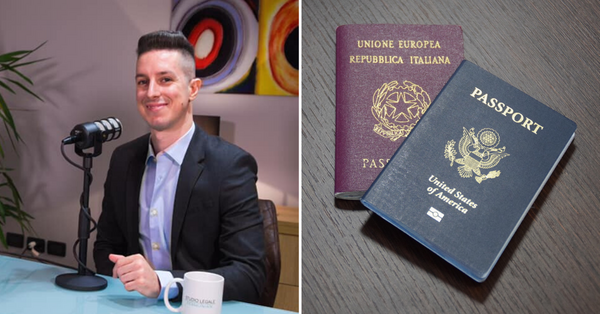Q&A: Could you be eligible for Italian citizenship by descent?
Around one in 20 Americans identify themselves as having Italian ancestry. That’s more than 16 million people. If you’re one of them, could you qualify for dual citizenship – and all the benefits of being a citizen of a European Union country?

A large majority of Italian-Americans are eligible, so there’s every chance you could. But even if you're certain you qualify, you’ll have to prove it legally before obtaining an Italian passport – and some of the rules are a little complex.
To help you understand them, The Local presents a Q&A with Marco Permunian, an Italian-born attorney and the founder of Italian Citizenship Assistance (ICA), a network of specialist lawyers with offices in both Italy and the US.
Q: Is there a generational limit on obtaining Italian citizenship by descent?
Marco Permunian: This is a question that's often asked by those interested in the possibility of obtaining Italian citizenship through their family lineage. However, it’s a common misconception that there's a simple generational limit.
To be clear: there are no generational limits as long as at least one of your Italian-born ancestors was still alive and an Italian citizen after the formation and unification of Italy in 1861.
Things become more complicated, however, if your Italian lineage includes a woman who gave birth to the next in your line of descent before January 1, 1948. In this case, you cannot apply for citizenship via an Italian consulate. This is because, prior to the promulgation of the 1948 Italian constitution, Italian-born women and women of Italian descent were unable to transfer their citizenship to their children.
However, nowadays it’s possible to pursue Italian citizenship in such cases via the court system; a 2009 ruling by the Italian Supreme Court declared retroactively that citizenship could be transferred by a female ancestor to children born before 1948.
Q: Do I need to be able to speak Italian?
MP: No, you don’t have to speak Italian to be eligible for Italian citizenship by descent. This is because, if you’re eligible, you’ve already been an Italian citizen since your birth – and you’re simply going through a process to be recognized as such.
You’re an Italian citizen since birth because citizenship is passed from one generation to the next. For example, it may have been passed from your Italian-born great-grandfather to your grandfather, from your grandfather to your father, and from your father to you. Since your father was an Italian citizen when you were born, you were also born with Italian citizenship.
 Marco Permunian. Photos: Italian Citizenship Assistance
Marco Permunian. Photos: Italian Citizenship Assistance The rules are different if you wish to apply for Italian citizenship through marriage. In this case, you do need to have an adequate knowledge of the Italian language under a law passed in December 2018. The required level is B1 of the Common European Framework of Reference for Languages – usually known as “intermediate”. The level must be certified by an educational institution approved by the Italian Ministry of Education or Ministry of Foreign Affairs.
Get your free, no obligations eligibility assessment from Italian Citizenship Assistance
Q: What are the qualification requirements?
MP: There are a few key things to remember in order to prove your right to Italian citizenship by descent. Firstly, you need to show that the initial Italian ancestor in your application remained an Italian citizen when the next person in your line of ancestry (a child of the initial ancestor) was born abroad.
Bear in mind that whenever there’s a woman in your Italian ancestral line, her child must have been born on or after January 1, 1948. While this rule has been successfully challenged in court (as described above), consular officials are still bound by this restriction.
You should also know that Italy has only allowed dual citizenship since 15 August 1992. That's why your Italian-born ancestor would have lost his or her Italian citizenship if he or she became naturalized in the US prior to that date. Finally, Italian citizenship cannot be passed on through any Italian ancestors who became naturalized in another country before June 14, 1912.
Q: What documents are required to apply?
MP: You need a number of documents pertaining to you as the applicant and your family that must be obtained from both Italy and the foreign countries where births, deaths, marriages or divorces occurred.
The number and type of necessary documents may change case-by-case but generally they include: Italian-issued vital records regarding the ancestor, civil status documents issued by foreign countries and any naturalization papers issued by the foreign country where the Italian ancestor petitioned to become a citizen.
 Photo: Italian Citizenship Assistance
Photo: Italian Citizenship AssistanceOnce you’ve collected the documents, each foreign document must have a Hague apostille attached to it. The apostille is a legal certification provided by the Office of the Secretary of State of the country where the certificate is issued.
Finally, foreign documents have to be translated into Italian. You must bring all the necessary documents to the Italian consulate on the day of your appointment.
Q: What are the advantages of taking Italian dual citizenship?
MP: Italian dual citizenship can give you many benefits and create incredible opportunities. First of all, it gives you the freedom to work, reside and study in Italy and across all the 27 EU member states without a visa.
An Italian passport also offers many further benefits. Firstly, it gives you the possibility of travelling visa-free to 97 countries, according to the Global Passport Power Rank 2020. Second, European citizens are often prioritized over people from outside the EU in terms of many professional and educational opportunities.
Third, the process of purchasing property in Italy will be much easier and more cost-effective, both in terms of the requirements and the transactions. Fourth, you’ll have the right to vote in local, national and European elections. Fifth, the Italian healthcare system is one of the best in the world and is free of charge or low-cost for Italian citizens, plus you’ll also have the possibility of further social welfare benefits, such as education, unemployment programs and pensions.
Think you could be eligible for Italian citizenship by descent? Find out more about Italian Citizenship Assistance and get a free, no obligations eligibility assessment.
This content was paid for by an advertiser and produced by The Local's Creative Studio.

Join the conversation in our comments section below. Share your own views and experience and if you have a question or suggestion for our journalists then email us at [email protected].
Please keep comments civil, constructive and on topic – and make sure to read our terms of use before getting involved.
Please log in here to leave a comment.